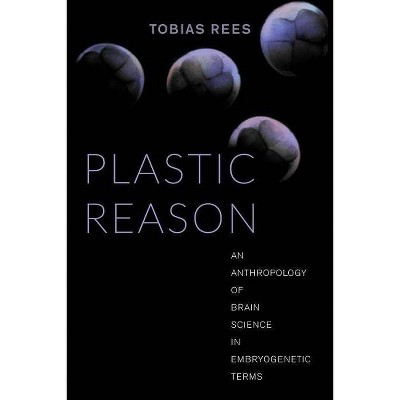Plastic Reason - by Tobias Rees (Paperback)

Similar Products
Products of same category from the store
AllProduct info
<p/><br></br><p><b> About the Book </b></p></br></br>"Throughout the twentieth century, neuronal researchers knew the adult human brain to be a thoroughly fixed and immutable cellular structure, devoid of any developmental potential. Plastic Reason is a study of the efforts of a few Parisian neurobiologists to undermine this rigid conception of the central nervous system and to show that basic embryogenetic processes--most spectacularly the emergence of new cellular tissue in form of new neurons, axons, dendrites, and synapses--continue in the mature brain. Furthermore, these researchers sought to demonstrate that the new tissues are still unspecific and hence literally plastic, and that this cellular plasticity is constitutive of the possibility of the human. Plastic Reason, grounded in years of fieldwork and historical research, is an anthropologist's account of what has arguably been one of the most sweeping events in the history of brain research--the highly contested effort to consider the adult brain in embryogenetic terms. A careful analysis of the breaking open of an established truth, it reveals the turmoil that such a disruption brings about and the emergence of new possibilities of thinking and knowing where before there were none."--Provided by publisher.<p/><br></br><p><b> Book Synopsis </b></p></br></br>Throughout the twentieth century, neuronal researchers knew the adult human brain to be a thoroughly fixed and immutable cellular structure, devoid of any developmental potential. <i>Plastic Reason</i> is a study of the efforts of a few Parisian neurobiologists to overturn this rigid conception of the central nervous system by showing that basic embryogenetic processes--most spectacularly the emergence of new cellular tissue in the form of new neurons, axons, dendrites, and synapses--continue in the mature brain. Furthermore, these researchers sought to demonstrate that the new tissues are still unspecific and hence literally plastic, and that this cellular plasticity is constitutive of the possibility of the human. <i>Plastic Reason</i>, grounded in years of fieldwork and historical research, is an anthropologist's account of what has arguably been one of the most sweeping events in the history of brain research--the highly contested effort to consider the adult brain in embryogenetic terms. A careful analysis of the disproving of an established truth, it reveals the turmoil that such a disruption brings about and the emergence of new possibilities of thinking and knowing.<p/><br></br><p><b> From the Back Cover </b></p></br></br>"<i>Plastic Reason</i> deftly tracks how the notion of 'plasticity' gathered persuasive force among a community of neuroscientists in France. Conducting and composing his ethnography through a series of conversational encounters with brain researchers, Tobias Rees elegantly illustrates how science is made in rhetoric, debate, and practice. In accounts of neural plasticity, he argues, novel notions of 'human nature' as unfixed, mobile, and open may be emerging."--Stefan Helmreich, Professor of Anthropology, MIT<p/><br></br><p><b> Review Quotes </b></p></br></br><br>"One of the most engaging and quirky anthropological monographs I have read in recent years."-- "Dialectical Anthropology"<br><p/><br></br><p><b> About the Author </b></p></br></br><b>Tobias Rees</b> is Associate Professor of Anthropology with a dual appointment in the Department of Social Studies of Medicine at McGill University.
Price History
Price Archive shows prices from various stores, lets you see history and find the cheapest. There is no actual sale on the website. For all support, inquiry and suggestion messagescommunication@pricearchive.us




















